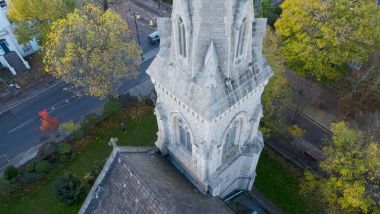Churches are keen to reach net zero but there are needless barriers in the way

The COP26 climate change summit in Glasgow has brought the eyes of the world to UK shores as we host the global gathering to tackle the climate crisis. The summit featured a substantial presence from the Anglican Communion, including the President of the Seychelles, who is himself an Anglican priest.
Our brothers and sisters from some of the world's most vulnerable countries came to urge stronger action to limit the rising temperatures and rising seas that were threatening their lives and livelihoods. This impacted me, because as the Body of Christ, when one part suffers, we should all feel it.
Having the meeting on our shores has brought greater focus on the Church of England's commitment to go net zero by 2030, a prophetic act which has received much praise from around the world. The congregation of my parish, St Luke's in North London, are very engaged with this goal and we are keen to do all we can to reduce our carbon footprint. However we have found our efforts foiled by the Church of England's own processes.
Preaching about creation care and sharing concern for our brothers and sisters on the front line of this crisis is fine but we need to be about actions as well as words. There's a huge potential for the Church of England to be a shining light on this subject. The eastward orientation of churches across the UK means we have lots of long, south facing, rooves which are perfect to put solar panels on. The Church has hundreds of acres of these roofs across the UK. Imagine if we put solar panels on them and became a net contributor of renewable energy to those around us. We would not only be a light of the world, but literally we'd be helping to keep the lights on.
And yet, here at St Luke's, we've found our application for solar panels blocked by an organisation called the Victorian Society. The Society attempts to preserve Victorian and Edwardian architecture and has the ability to block applications it deems will affect the aesthetic of certain buildings. They claim the panels will be 'visible' and therefore have objected to their installation at St Luke's.
We don't want to hide the solar panels, we want everyone around to see them on our roof. This is a fantastic chance to spread the good news – that there is hope in the darkness of the climate crisis and churches are playing their part. When our brothers and sisters are already suffering devastating effects of the climate crisis, how can we be arguing about the aesthetic effect to buildings? Surely blood and flesh means so much more than stones and cement?
We have a willing congregation and hope to have funding in place for the panels. If even we can't get through the Church of England's arcane planning system, the Church is going to struggle to meet its 2030 net zero target. There needs to be efforts to support churches on the ground like ours who are trying to make that happen. We are pretty determined, but even we are not going to win a battle where the Church of England's own processes are working against us.
The Church Commissioners also have a role to use their financial might to make it easier for churches to take these steps. St Luke's has managed to secure funding for an air-source heat pump and hope to do so soon for solar panels through local grants, however the chances are that not every church will be so lucky, especially those situated in impoverished areas. The Church Commissioners should provide the funding for local churches less able to access funds.
The Church of England has been rightly praised by people across the planet for their bold stance to go net zero. It will be a tough task to achieve and if we're going to be deserving of that praise, we need all parts of the Church pulling in the same direction. If even eager and keen churches cannot do something as simple as installing solar panels, then we risk just adding to the greenwashing emanating from Glasgow, while also letting down the Body of Christ.
John McKenzie is vicar of St Luke's, West Holloway, in London.











